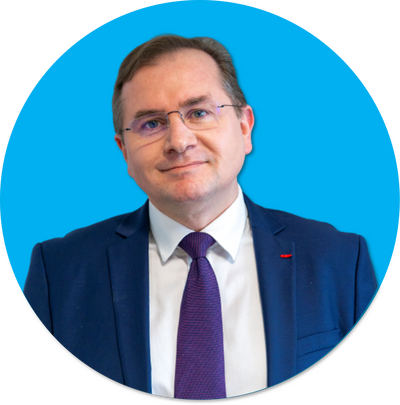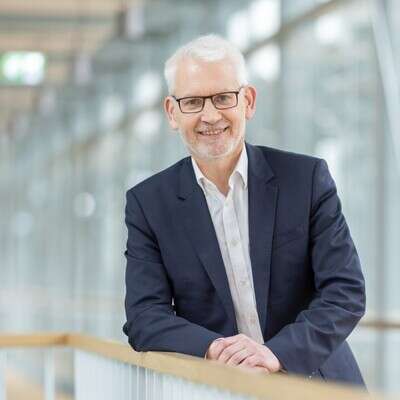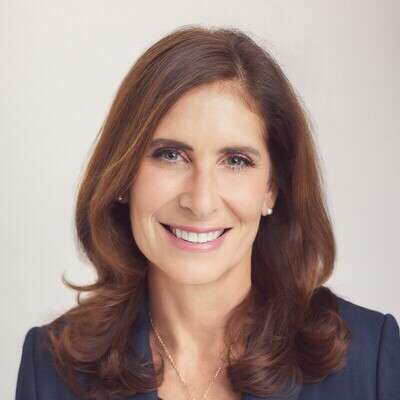Boyden Executive Survey
Executive View with Philippe Piron, President & CEO, GE Power Conversion and Grid Solutions
"Agility and organisational learning to adapt in the right way are critical elements for company survival."

Today’s complex landscape demands adaptive, empathetic leaders, who accelerate decision-making to navigate opportunity and mitigate risk. In an exclusive series, Boyden's data-driven 2023 research on Exploring adaptivity through strategy and talent is complemented by in-depth interviews from trailblazers across the globe, sharing their perspectives on core issues across organisational strategy, leadership and talent.
This interview features Philippe Piron, President & CEO, GE Power Conversion and Grid Solutions.
Discussion Highlights:
- Our industry is defined by increasingly accelerated energy security transition
- The market is about anticipation, so scenario planning is key
- Leadership teams need to adapt and plan capabilities well in advance
- Leaders need an instinct for how geopolitical and macro-economic elements impact the business; guided less by analytics and more by awareness
- Strong need for engineering talent aligned to changing resource needs
- Customers expect a more entrepreneurial mindset from their providers
- Strategic discussions are held with customers to anticipate needs in 10-20 years, particularly around electrification and decarbonisation
- Growth is no longer about price; it is about building solutions to meet customer needs in market that is evolving into a seller’s market
Boyden: With sustainability concerns, rapid AI developments and geopolitical risk, how does adaptivity impact leadership today?
Philippe: It takes agility and organisational learning to adapt in the right way – these are critical elements for company survival. It’s even more important today, when we are facing strong headwinds over the last two years, with the Russia-Ukraine crisis and inflation. If you have people who can move very fast and also anticipate, to adapt in advance, then you are well placed to address key issues.
“Adaptivity is about mindset and culture… it is not about analytics, it’s about awareness, the ability to adapt and anticipate and help companies move fast”
I am asking all my people to anticipate possible scenarios for what’s going to happen at least three years in advance and one year in advance relative to our competition. Adaptive leadership is about mindset and culture, addressing geopolitical and macro-economic elements and what this means for the business and then developing a kind of instinct based on that, because it is not about analytics, it’s about awareness, the ability to adapt and anticipate and help companies to move fast.
I am the kind of CEO who does not need to have 99 percent of the info to make a decision. I will take decisions based on 70 percent and go in a certain direction; if we have to change course, then we adapt. If you wait for 99 percent, the necessary creativeness and responsiveness needed in the market is not going to happen. It’s about more than covering the technical moves.
• • •
Boyden: Is today’s disruptive environment changing the relationship between the board and the leadership team?
Philippe: It depends on the style of the board. Governance is more involved due to increasing turbulence and complexity, so the board is more present in really challenging or supporting the executive team. It’s not necessarily a question of specific skills, but regular interactions in terms of solutions at the higher level – it’s more about the link between the board and the executive, which has definitely increased.
• • •
Boyden: To what extent are you facing retention challenges at senior level?
Philippe: Making strong, cohesive teams is the number one priority for me and maintaining that cohesiveness despite hardships and headwinds is very important.
We see some attrition, not particularly at the senior level, it’s the level below that is the issue; the world of energy is moving quite fast, so due to requirements resources keep diminishing at mid-management level. At present the talent pool is very challenging, particularly in engineering management and system engineering, software engineering, middleware engineering, so this is where we have to focus.
“In terms of strategy, we now need to review it every two years, whereas as in the past it was three to five years. And it’s changing a lot, particularly the portfolio of customers”
Other concerns are starting to impact this, like the disruption we experienced after Covid and the Russia-Ukraine crisis – this is impacting the supply chain, our ability to adjust to different customer segments, and move very fast between different outlets.
In terms of strategy, we now need to review it every two years, whereas as in the past it was three to five years. And it’s changing a lot, particularly the portfolio of customers. When I arrived at GE Power Conversion, I had a very strong focus on Marine, less on Oil & Gas, and Industry was lagging behind. In less than a year and a half this all changed, and we became number one in heavy industries and energy-intensive applications. This kind of change wasn’t obvious one year ago.
The success of the company depends on mobility across different segments and product lines to maintain service and responsiveness. Getting good people with different domain expertise takes five to eight years to build up, so the question is ‘how do you address and prepare for this competency’? If a former ‘lesser segment’ is ramping up, you need to have people capability ahead of time, which requires a lot of briefings between the product lines to make sure the system is reliable and resilient.
• • •
Boyden: How is today’s environment affecting decision-making? Are you relying more on particular people or roles?
Philippe: In all our entities the C-suite is very international with executives from across the European continent and North America, and things are changing very fast. Today, business line leaders and teams are as important as they have always been; in functional leadership HR and Finance are the key ones, particularly at GE because all functions need to be operational. Legal, Finance and HR are extremely involved in day-to-day operations and have strong knowledge of each business line. To reconnect the impact of business strategy to the commercial side, Finance and HR are key; this is particular to the DNA of GE.
For example, all our C-suite members, especially Finance and HR, work on the shop floor twice a year on lean exercises, spending one week with the team, and it’s not rare for them to participate in critical meetings with customers as well.
• • •
Boyden: How are customer needs changing?
Philippe: Customers expect a more entrepreneurial mindset. Some of our customers are growing very fast, with double- or triple-digit growth, so the question from them is ‘how can you sustain and help us to deliver what is needed in terms of energy security and huge transitions, driven particularly by electrification in Europe?’. The Russia-Ukraine crisis has been a key element; on the other hand, also emissions and control, and digital solutions. Different segments are high in demand and bring high expectations too.
• • •
Boyden: How are your conversations changing around growth?
Philippe: Growth is definitely driven by the strategic vision we have with customers on what they need in ten to twenty years.
“We need to anticipate with the customer what could be the right solutions for the next ten years, then enter into more differentiated strategies or partnership strategies to make change possible”
There are two main pillars here: electrification and decarbonisation; and in addition, oil & gas, marine, electric-intensive industries. We need to anticipate with the customer what could be the right solutions for the next ten years, then enter into more differentiated strategies or partnership strategies to make change possible. We see a difference today versus the past, which was more transactional with a competitive bidding approach.
So, growth is there, and we are co-building solutions with the customer because they are in hurry to get proper solutions for their needs, and it is becoming a different game. There is less and less exposure to traditional ways of growing by having the lowest possible price. It’s now a question of how we build solutions to meet customer needs, because it’s becoming more of a seller’s market than a buyer’s market, including outlets.
With new technologies the customer is definitely willing to push us on innovation, not only because we are in the economy of networks, but you need two to three system providers each time offering technologies; this provides security for them with inter-operability and inter-connectivity of the different systems. What they are looking at more and more is sustainability and imposing strict conditions on how we will deliver, to make sure scope one, two and three targets are met.
• • •
Boyden: Do you think companies will be ready for the global stocktake at COP 28?
Philippe: COP will continue to run one after another. But how we are going to meet energy needs and net zero strategies in the longer term will be a challenge. Today, the question is how we become stronger in our capabilities. In the UK, envisaging the level of government requirements and in meeting government targets, customers are going for more than 50 gigawatts to be built in offshore wind by 2030; at the same time Germany and the Netherlands are adding 40 gigawatts, which is a capacity issue, due to the need for system providers and competitors capable of responding to that.
“The level of expectation [in energy security transition] is higher than what the ecosystem can deliver today. We need to discuss this together as a full value chain to work out how to make things happen”
It's almost like the same period in the development of an energy infrastructure post war; how we are going to build that? Today it’s the result of the energy security transition, which is getting extremely accelerated. That’s a challenge which requires cooperation between system suppliers, customers and local government in setting the targets and providing the right assistance in terms of resource. There is a disconnect here; the level of expectation is higher than what the ecosystem can deliver today. We need to discuss this together as a full value chain to work out how to make things happen.
• • •
Boyden: How is the current environment affecting your people strategy?
The top priority is to find the right technical skills in countries driving most of the growth – in Europe, it’s primarily Germany and the UK – and then also North America.
“We need to bring in people who are comfortable with a really high level of autonomy and dynamism, as well as capability and an ability to anticipate and be more proactive”
So, it’s clear that first it is technical skills, and after that mindset is important in this complexity; we need to bring in people who are comfortable with a really high level of autonomy and dynamism, as well as capability and an ability to anticipate and be more proactive. It’s less and less about people who have pure responsibility at a certain level in the organisation. The clear need for GE is having a lean mindset in manufacturing and lean engineering, which is promoted every day and pushed from the top to the bottom of the organisation.
• • •
Boyden: What do you expect GE Power Conversion and Grid Solutions to look like in five years’ time?
Our set up will stay the same. It’s a dynamic and lean organisation, more decentralised, closer to the customer, with a concentration on fieldwork and technology; our push in that direction already gives us good results. It’s a back-to-basics approach; today when it’s really very turbulent, we rely on expertise at the point of impact, with people as close as possible to the customer and relying on people at the top to take the right decision at the right moment. In our particular business within GE, being lean is applicable to the whole organisation, especially the project engineering business, so it’s very good to get responsiveness to the point of impact for the customer, to anticipate needs and be able to regulate our services.
Read Full Report
Boyden Global Executive Survey 2023: Exploring adaptivity through strategy and talent
- - -
Executive Biography
Philippe Piron is President & CEO at GE Power Conversion and Grid Solutions, units of GE Vernova and two major Energy Conversion and Transmission Systems providers that design, manufacture, integrate, install and service electrification solutions that contribute to decarbonize energy-intensive and mission-critical applications.
Philippe works with talented teams that rise to the challenge of building a world that works with leading-edge technologies contributing to the global energy transition. Grids that connect everything from traditional thermal generation and offshore renewables to load centers such as city centers, industrial plants and naval ship yards are at the core of this new revolution.
GE recently announced a contract awarded by Larsen and Toubro, in the Kingdom of Saudi Arabia, to supply gas-insulated substations for the world’s largest utility-scale hydrogen plant to be powered entirely by renewable energy.
Philippe has been a CEO since 2005 in Aerospace & Defence, Energy, Telecoms & High-Tech.
This interview was enabled by Elizabeth Garforth, Partner, France and Boyden Global Co-Leader, Aerospace & Defence.




